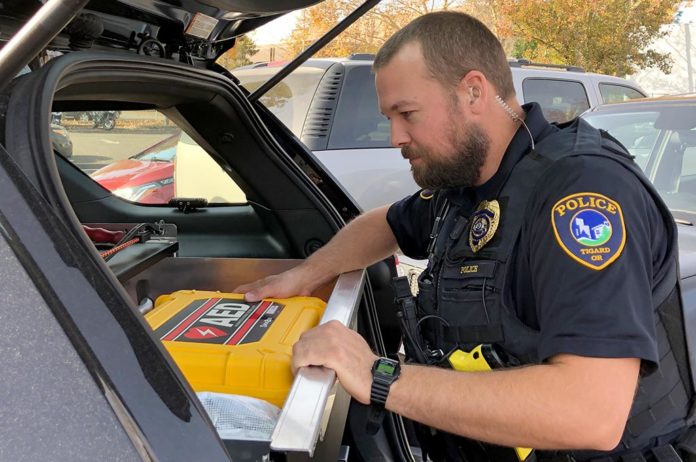“Winco employees were crucial in helping save this man’s life. It was a textbook response, and they did everything right,” says Tigard Police Officer Nate Will. The man had suffered from a cardiac arrest and fell to the ground in the produce aisle of Winco on an afternoon in October. The employees administered CPR chest compressions for about 3-5 minutes by the time Officer Will was dispatched and arrived on the scene along with Officer Nunley.
 Officer Will, who is a CPR and First Aid instructor for the department, relieved the employees and resumed compressions for around three minutes until Tualatin Valley Fire and Rescue (TVF&R) and Metro West personnel arrived, set up their equipment, and took over. Ultimately, the quick response of the employees and the efforts of the emergency responders resulted in a life saved.
Officer Will, who is a CPR and First Aid instructor for the department, relieved the employees and resumed compressions for around three minutes until Tualatin Valley Fire and Rescue (TVF&R) and Metro West personnel arrived, set up their equipment, and took over. Ultimately, the quick response of the employees and the efforts of the emergency responders resulted in a life saved.
Tigard Police Officers frequently respond to medical calls such as the one at Winco. From January to October 2019, officers responded to an average of 13 dispatched calls per month involving CPR and an average of 10 calls assisting firefighters on other types of fire/medical calls. As such, all police patrol vehicles are stocked with a first-aid kit, AED, trauma kit, and Naloxone, which is used to reverse an opioid overdose. Officers are all certified in first aid, CPR, and administering AEDs and receive training every one to two years.
When medical calls are dispatched, Tigard Patrol Officers often arrive before other emergency personnel. “Officers may be responding to another call or patrolling near the incident. Our proximity allows us to get there, start administering CPR, and applying an AED until emergency medical arrives,” says Commander Jamey McDonald.
Once TVF&R and Metro West arrive, they direct first-aid efforts. Officers will continue to assist where needed and secure the scene. During the Winco incident, Officers Nunley and Rivera maintained a perimeter around the equipment, patient, and emergency personnel to allow sufficient room to tend to the patient without disruption. They also comforted the patient’s significant other. From there, officers typically stay on the scene until the patient is transported to the hospital.
On a number of these calls, the patient cannot be resuscitated. Officer Will and other emergency responders will continue to administer first aid in order to be sure. Despite a grave prognosis, he manages to stay on course by focusing on the timing of the compressions. When it is time to relent, Officers will conduct an investigation at the scene to confirm that the individual died from natural causes.
Fortunately, in this case, Winco employees were in a position to react quickly to help emergency responders save a life. When people need help, minutes matter. Says Commander McDonald, “The faster we can get there when someone calls 9-1-1 regardless of what it is–whether it is a crime or a medical issue–allows us to provide the best level of service we can for the community and achieve better outcomes.”























